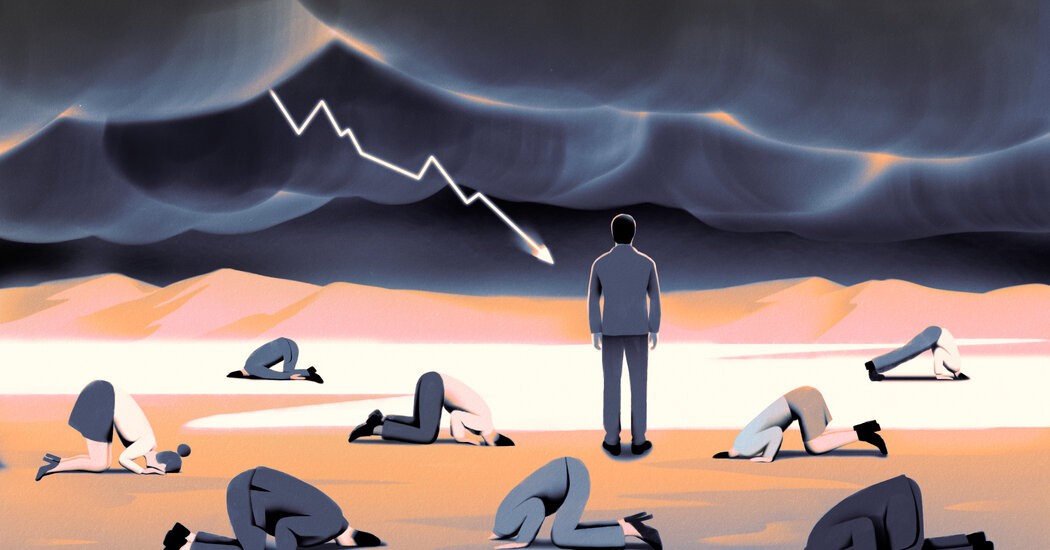
China’s entrepreneur class is grappling with the worst economic slump in decades as the government’s zero Covid policy has shut down cities and kept would-be customers at home. Yet they can’t seem to agree on how loudly they should complain — or even whether they should at all.
A tech entrepreneur wrote in a big group chat in May that many members were too critical. “What people here do every day is criticizing the government and the system,” she wrote. “I can’t see any entrepreneurship in this.”
A top venture capitalist told his nearly nine million social media followers that as much as everyone had suffered from the pandemic, they should try to stay away from negative news and information.
Their approach, the equivalent of an ostrich sticking its head in the sand, doesn’t make sense to Zhou Hang. Mr. Zhou, a tech entrepreneur and a venture capitalist, has questioned how his peers can pretend it’s business as usual, given the political and economic upheaval. Stop putting up with the ridiculous reality, he urged. It’s time to speak up and seek change.
Mr. Zhou is rare in China’s business community for being openly critical of the government’s zero Covid policy, which has put hundreds of millions of people under some kind of lockdowns in the past few months, costing jobs and revenues. He’s saying what many others are whispering in private but fear to say in public.
“The questions we should ask ourselves are,” he wrote in an article that was censored within an hour of posting but shared widely in other formats, “what caused such widespread negative sentiment across the society? Who should be responsible for this? And how can we change it?”
He said the lockdowns in Shanghai and other cities made it clear that wealth and social status meant little to a government determined to pursue its zero Covid policy. “We’re all nobodies who could be sent to the quarantine camps, and our homes could be broken into,” he wrote. “If we still choose to adapt to and put up with this, all of us will face the same destiny: trapped.”
For Mr. Zhou, staying out of politics is no longer an option for China’s business leaders. But some of his peers are reluctant, given the potential penalties.
The Chinese Communist Party has always been wary of the influence of the business class, even as it tried to co-opt its members to help strengthen the country’s economy. Under China’s current top leader, Xi Jinping, the party’s attitudes toward the private sector took a more hostile turn and made the entrepreneur class the boogeyman for social ills.
In the past few years, the government has steered away from the market economy and cracked down on some industries. It demonized entrepreneurs and went after some of the most prominent of them. Then when the mild, albeit contagious, Omicron variant of the coronavirus emerged in China this year, the government meddled with free enterprise as it hadn’t in decades.
The lockdowns and restrictions have done so much damage to the economy that Premier Li Keqiang summoned about 100,000 cadres to an emergency meeting in late May. He called the situation “severe” and “urgent,” citing sharp drops in employment, industrial production, electricity consumption and freight traffic.
Many business leaders believe that it will be hard to reverse the damage if the government doesn’t stop the zero Covid policy. Yet they feel that there’s nothing they can do to make Beijing change course.
The chairman of a big internet company told me that with all the pandemic restrictions, he and others were operating as if dancing with shackles on while expecting the sword of a lockdown to strike at any moment. With a big public company to run, he said, it would be too risky to be vocal. He hoped the economists could be more outspoken.
The chairman of a publicly listed conglomerate with many consumer-facing businesses said he had to shut down a few of his companies and let people go as revenues dropped off a cliff. He’s not a Christian, he said, but he has been praying to God every day to help him get through this tough period.
There are good reasons to fear speaking out. Mr. Zhou’s post was censored, as were a couple of others by entrepreneurs who argued for a more balanced approach between pandemic control and economic activities. James Liang, the chairman of travel site Trip.com as well as a trained economist, wrote a few articles that compared the pros and cons of different pandemic policies. Then, in mid-May, his social media Weibo account was suspended.
Stakes could be much higher than a few censored articles and suspended social media accounts.
Jack Ma, the founder of the e-commerce behemoth Alibaba, largely disappeared from public view after he criticized banking regulators in late 2019. The regulators quashed the initial public offering of Ant Group, the tech and financial company controlled by Mr. Ma, and fined Alibaba a record $2.8 billion last year.
June 10, 2022, 5:48 p.m. ET
Ren Zhiqiang, a retired real estate developer, was sentenced to 18 years in prison on charges of committing graft, taking bribes, misusing public funds and abusing his power. His real crime, his supporters say, was criticizing Mr. Xi’s handling of the coronavirus outbreak in early 2020.
Mr. Zhou, 49, is known as a maverick in Chinese business circles. He founded his first business in stereo systems with his brother in the mid-1990s when he was still in college. In 2010, he started Yongche, one of the first ride-hailing companies.
Unlike most Chinese bosses, he didn’t demand that his employees work overtime, and he didn’t like liquor-filled business meals. He turned down hundreds of millions of dollars in funding and refused to participate in subsidy wars because doing so didn’t make economic sense. He ended up losing out to his more aggressive competitor Didi.
He later wrote a best seller about his failure and became a partner at a venture capital firm in Beijing. In April, he was named chairman of the ride-sharing company Caocao, a subsidiary of auto manufacturing giant Geely Auto Group.
A Chinese citizen with his family in Canada, Mr. Zhou said in an interview that in the past many wealthy Chinese people like him would move their families and some of their assets abroad but work in China because there were more opportunities.
Now, some of the top talent are trying to move their businesses out of the country, too. It doesn’t bode well for China’s future, he said.
“Entrepreneurs have good survivor’s instinct,” he said. “Now they’re forced to look beyond China.” He coined a term — “passive globalization” — based on his discussions with other entrepreneurs. “Many of us are starting to take such actions,” he said.
The prospect depressed him. China used to be the best market in the world: big, vibrant, full of ambitious entrepreneurs and hungry workers, he said, but the senseless and destructive zero Covid policy and the business crackdowns have forced many of them to think twice.
“Even if your company is a so-called giant, we’re all nobodies in front of the bigger force,” he said. “A whiff of wind could crush us.”
All the business leaders I spoke to said they were reluctant to make long-term investment in China and fearful that they and their companies could become the next victim of the government’s iron fist. They’re focusing on their international operations if they have them or seeking opportunities abroad.
Mr. Zhou left for Vancouver, British Columbia, in a hurry in late April when Beijing was locking down many neighborhoods. Then he wrote the article, urging his peers to try to speak up and change their powerless status.
He said he understood the fear and the pressure they faced. “Honestly speaking, I’m scared, too.” But he would probably regret it more if he did nothing. “Our country can’t go on like this,” he said. “We can’t allow it to deteriorate like this.”
In recent years, a few of Mr. Zhou’s articles and social media accounts have been deleted. His outspokenness has caused uneasiness among his friends, he said. Some have told him to shut up because it didn’t change anything and was creating unnecessary risks for himself, his family, his companies and the stakeholders in his businesses.
But Mr. Zhou can’t help himself. He’s worried that China could become more like it was under Mao: impoverished and repressive. His generation of entrepreneurs owes much of their success to China’s reform and opening up policies, he said. They have the responsibilities to initiate change instead of waiting for a free ride.
Maybe they can start by speaking up, even if just a little bit.
“Any change starts with disagreement and disobedience,” he said.




